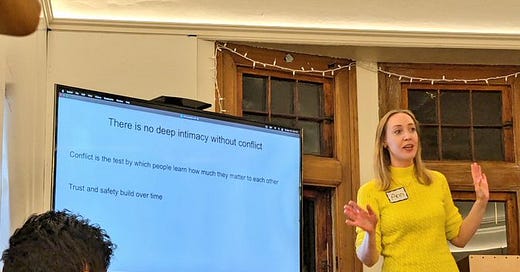Understanding Interpersonal Conflict
My distilled “theory of everything” vis-à-vis conflict and relational health
This started as a talk I gave at The Love Symposium in Berkeley on November 15, 2024, then became a viral tweet, and now lives here as an essay. May there be many mutations to come!
A conflict is a disagreement. Not all disagreements escalate into fights.
Fights are caused by threat (real or perceived). Some people are more threat-sensitive than others and will even read into neutral situations to see threat -- especially related to a core insecurity or fear. People who are highly threat-sensitive can be scary and controlling, but it comes from a tender and hurt place. Still you should probably steer clear of them if you don't like fighting.
The most ubiquitous threat most of us encounter day-to-day is invalidation. Invalidation = communication that conveys you are bad or wrong. Even if we are logical people, our body processes this like "you should not exist." It takes a strong sense of self and skill in emotional regulation to remain stable when someone is invalidating us.
We invalidate each other all the time though, and here's why. Perspective-taking is computationally expensive for our brains, so what we do instead is called projecting. Projecting is when you assume other people are like you. The problem is, because we're constantly projecting instead of empathizing, everyone appears to us like failed versions of ourselves -- doing things we would not do for reasons that are not immediately obvious. So we bucket this confounding behavior into catchalls like "bad" and "wrong."
Because our projecting brains give us the illusion that we understand others more than we do, we misunderstand each other constantly. Like just about always.
If you want to collaborate with people effectively, you need to reduce threat and create safety. This isn't "kumbaya" nicey-nice stuff; the world's top negotiators teach this exact thing. Threatened people are defensive, calculating, focused on "winning." They are limited in what they can see and think. People who feel safe can be honest, objective, creative, collaborative.
Fights are almost never about the thing they appear to be about on the surface. When people feel safe, they can start to tap into their subconscious and communicate what they really care about. So if your spouse wants to move to a new city because they desire adventure, but you fear losing touch with your family, you can begin to surface possibilities related to increasing adventure and keeping in touch with family. The deeper you go into these underlying concerns, the more you realize there are many more than 2 options here, and you can both have what you want.
Emotional validation is a near-panacea for decreasing threat and increasing safety. Validation means approval. Sometimes you don't approve of what someone is doing, saying, or the conclusions they've reached. But no matter how much you disagree, you can always validate someone on the level of feeling. That's because emotions are just bodily functions. Emotions originate as changes in our body (slowed digestion, increased heart rate, diverted blood flow) brought on by perceived threat. These signals eventually travel to our brain where we attempt to interpret them intellectually. But all things said, they're involuntary. So there's no reason for judgments like "You shouldn't be angry." We say things like this when we want to control the other person. But this just increases threat, intensifying the feelings. So instead you should show acceptance and concern for emotions (e.g. nod, mirror someone's frustration back to them on your own face).
The other thing is to make room for multiple perspectives to exist. Most people inherently take a "monologue stance" about conflict. They practice what they will say with the intent to deliver it as a declaration about the other's badness/wrongness. But the truth is, as sure as you feel, you just don't have all the information. People are incredibly surprising when you seek clarification from them. Turns out, you misinterpreted what they meant. Or there was a reason for their behavior you would never have guessed. So it's much better to approach people neutrally like, "Here's what I was feeling and thinking and the way I interpreted this. What was it like for you?"
Ultimately, if you invalidate someone, they'll invalidate you back. If you try to control someone, they'll try to control you back. You win by letting go. Even in an extreme case e.g. someone you love is diagnosed with schizophrenia and is not taking their meds because they don't believe they're sick. You could try to force them to believe they're sick, but you'll fail. Disagreements will escalate into fights. If instead you allow them to be who they are, feel how they feel, think what they think.. you can start to have an honest relationship, and then you're not so stuck. e.g. They tell you that the thing they can't stand about the meds is fatigue. So you can start to address that together.
Conflict is the test by which people learn how much they matter to each other.
Conflict is the test by which people learn how much they matter to each other. Disagreements will happen. The more you interweave your life with someone, the more likely that is. Voicing that disagreement is a risk. It's scary. The other person could judge you, dismiss you, label you "not worth it." But dealing with disagreement is an investment in the long-term potential of a relationship. When both of you take that risk and invest energy into hashing things out, a deeper level of intimacy is unlocked. The relationship is stronger than it was before. When your friend knows that you won't make them bad/wrong, invalidate their feelings, or push your perspective on them, that safety feels a lot like love.





i love the way your descriptions are so concise and to the point